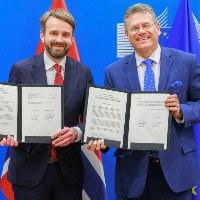(BRUSSELS) – The EU and Norway signed a Memorandum of Understanding Thursday to launch a strategic partnership to develop sustainable land-based raw materials and battery value chains.
The MoU was signed by EC vice-president Maros Sefcovic and Norway’s trade minister Jan Christian Vestre.
The new partnership offers a framework for long-term cooperation between the EU and Norway in the area of two value chains seen as of strategic importance.
“We are bringing cooperation between the EU and Norway to another level, as today’s signature is of strategic value,” said Mr Sefcovic. “It will create a wide range of business and research opportunities on both sides, strengthening both our industrial base and our political bond.”
Supported by geographical vicinity, their closer integration can help decrease the risks of trade disruptions, while increasing overall competitiveness of our economies and creating high-quality jobs.
The signature coincides with the 30th anniversary of the European Economic Area Agreement, which ensures Norway’s participation in the Single Market and forms a cornerstone for our relations. It further demonstrates their potential.
This MoU establishes cooperation between the EU and Norway in the following five areas:
- Integration of raw materials and batteries value chains, by facilitating joint investment projects through joint ventures, consortia, special purpose vehicles and other forms of cooperation by industrial actors, including linking final users with raw materials suppliers.
- Cooperation on research and innovation (R&I), while results from joint projects will provide a good basis for potential industrial uptake and implementation. Norway is very active in the Horizon Europe research programme.
- Application of high environmental, social and governance standards and practices will be facilitated through mutual consultation and exchange of information on relevant policies and initiatives along the entire value chains, including recycling and waste management.
- Mobilisation of financial and investment instruments to support investment projects under the Partnership, notably through Invest EU, the European Raw Materials Alliance and the European Battery Alliance.
- Developing necessary skills for high-quality jobs in raw materials and battery sectors. This includes mobilising stakeholders and financial support for the development and deployment of adequate initiatives and the uptake of existing ones like the European Battery Academy.
Norway is a mineral rich country with rare earths, magnesium, titanium, vanadium, phosphate rock and other resources under consideration. It also has a large processing capacity for many raw materials. In the past years, the battery sector has been growing significantly, with many new ventures across the full value chain.
The EU has a well-established and growing market for green technologies, like batteries, with an estimated demand in 2023 of 175 GWh that offers many opportunities for offtake agreements, joint ventures and joint R&I projects. The EU battery industry is the second largest in the world with existing facilities having up to 220 GWh of ramp up capacity and an additional 1 TWh of battery manufacturing projects has been announced or are currently under construction.
European Commission on Strategic Partnerships on Raw Materials
Dedicated European Commission site on Raw materials diplomacy


